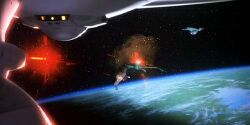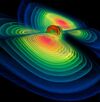Photon
A photon is a very small particle or wave that is only viewable by the tiniest imaginary microscope, by drinking seven (which is important because it is a prime number) too many beers, or by just opening your eyes and letting some in.
Describing a photon to your friends is easy once you realize what it is: Nothing powered by everything. And then some.
Etymology[edit]
The word photon was coined by physicist Gilbert "Jerry" Lewis in 1926. He named it after his black and white dog (pictured). Not very exciting, but the entire Lewis family got a kick out of it, as did the Nobel Prize committee.
Importance[edit]
The photon is the fundamental particle of light, and of light opera. Based on the pioneering work of librettist Max Planck, the boy-genius wunderkind, Albert Einstein, described both light and light opera as fundamentally based on particles ("bit parts") called photons. These particles possess no mass (Spanish for "no more", a frequent reaction to both light and opera) but do have momentum, a momentum generally produced by waves and/or word-of-mouth. The momentum of light can be felt when it hits you and you feel heat. The momentum of light opera can be calculated from the equation E=S, where E represents excitement and S eventually stands for snoring.
Photons can also be exploded out of torpedoes in Star Trek (see: Photon Torpedoes). Besides looking around and seeing stuff, this is how most people know about them.
Unique properties[edit]
Photons do not occupy space, yet they travel through space. They have no components, yet they have energy as their own component. They are divisible as well as indivisible particles. Two or more photons can exist at the same space at the same time, and even then they cannot make up their minds whether to be a particle or a wave.
What?[edit]
What's up with all of that?
| ||||||||||||||||

